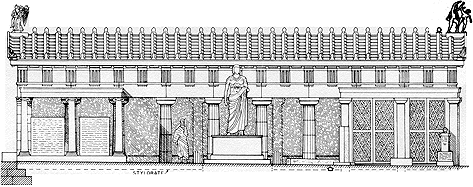×

|
Meletus, a poet, initiated the prosecution against Socrates, although most scholars consider him to a "puppet" of the best-known and most influential of the three accusers, Anytus. The affidavit sworn out by Meletus made two related charges against Socrates: "refusing to acknowledge the gods recognized by the State and of introducing new and different gods" and "corrupting the youth." Plato in the Euthyphro describes Meletus, the youngest of the three accusers, as having "a beak, and long straight hair, and a beard which is ill grown." Plato wrote that, prior to the prosecution of Socrates, Meletus was "unknown" to him. During the first three hours of trial, Meletus and the other two accusers each mounted a small stage in the law court in the center of Athens to deliver speeches to the jury making the case for the guilt of Socrates. No record of Meletus's speech survives. According to the partisan account of Plato in the Apology, Socrates--during his three-hour defense--entered into an exchange with Meletus and succeeded in making him appear rather dim-witted. For example, Plato reports Socrates trapping Meletus into saying "I say that you do not believe in any gods at all" and then exposes his accusation as nonsensical. Meletus' motivation in bringing charges against Socrates is a matter of considerable debate. It may have sprung either from his religious fanaticism or his anger over Socrates's association with the Thirty Tyrants. It is also possible that he was to some degree upset with the low opinion of Socrates for poets. (In Plato's Gorgias, Socrates accuses poets and orators of flattery and says that they move only women, children, and slaves.) Greek historian Diogenes Laertius, writing in the first
half of the
third century, reported that after the execution of Socrates "Athenians
felt such remorse" that they banished Meletus from their city.
This
report is often questioned, however, as it is inconsistent with other
earlier
writings which offer no such indication of widespread regret over the
jury's
actions in 399 B.C.E. |
|
Anytus, a powerful middle-class politician from a family of tanners, is generally considered to have been the driving force behind the prosecution of Socrates. Prior to his political careet in Athens, Anytus served as a general in the Peloponnesian War. Blamed for losing Pylos to the Spartans, Anytus faced charges of treason, but was acquitted--with the help of a well-placed jury bribe, according to several accounts. Anytus gained influence in Athens by playing a leading role in the democratic revolt of 403 B.C.E. that succeeded in overthrowing the Thirty Tyrants. Despite having lost property and money during the eight months the tyrannical oligarchy ruled Athens, Anytus made no attempt to compensate himself for his losses, thus earning additional favor with the public. Anytus supported the Amnesty of Eucleides in 403 that prohibited prosecution of offenses occurring during or before the Rule of Thirty. Anytus' motivation in prosecuting Socrates is believed to have been based on his concern that the Socrates's criticism of Athenian institutions endangered the democracy that Athens had so recently regained. Socrates, who was associated with several persons viewed as responsible for the 404 overthrow of Athenian democracy, made no secret of his disdain for politicians such as Anytus. Even after democracy was restored, he continued to ridicule such centerpieces of Athenian democracy as the selection of leaders by majority vote. Plato's Meno offers some possible clues as to the animosity between Anytus and Socrates. In the Meno, Plato reports that Socrates's argument that the great statesmen of Athenian history have nothing to offer in terms of an understanding of virtue enrages Anytus. Plato quotes Anytus as warning Socrates: "Socrates, I think that you are too ready to speak evil of men: and, if you will take my advice, I would recommend you to be careful." Anytus had an additional personal gripe with Socrates. Socrates had a relationship with the son of Anytus. Plato quotes Socrates as saying, "I has a brief association with the son of Anytus, and I found him not lacking in spirit." It is not known whether the relationship included sex, but Socrates--as were many men of the time in Athens--was bisexual and slept with some of his younger students. Anytus almost certainly disapproved of his son's relationship with Socrates. Adding to Anytus's displeasure must have been the advice Socrates gave to his son. According to Xenophon, Socrates urged his son not to "continue in the servile occupation [tanning hides] that his father has provided for him." Without a "worthy adviser" his son, Socrates predicted, would "fall into some disgraceful propensity and will surely go far in the career of vice." |
|
Little is known about the third accuser, Lycon. He is described as "an orator," another profession Socrates held in especially low regard. Socrates contended that orators were less concerned with the pursuit of truth than in using their oratorical skills to obtain power and influence. Diogenes Laertius, writing in the third century C.E., calls Lycon a "demagogue" who "made all the necessary preparations" for the trial. Laertius's use of the word "demagogue" suggests that Lycon may have been a supporter of the common man (in Socrates' view, perhaps, a rabble-rouser). As such, he likely perceived Socrates as a threat to the democracy he highly valued. Lycon may also have blamed Socrates for a homosexual
relationship
between his son, Autolycus, and a friend of Socrates--three decades
older
than Autolycus--named Callias. In Plato's Symposium,
Socrates,
during a dinner party, praises the "higher love" of Callias for the
much-younger
Autolycus. |
|
|